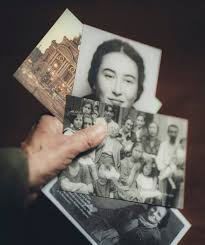As one might expect, a Judaic library has a large number of books about the Holocaust, which has cast its shadow over almost every event in modern Jewish history.
On January 27, International Holocaust Remembrance Day will be marked by decree of the United Nations. This date is not arbitrary. It commemorates the day in 1945 when the Red Army entered Auschwitz, where more than 1.1 million Jews were murdered.
Auschwitz accepted its first prisoner in June 1940. Originally built as a prison camp for Polish political prisoners, in 1942 it also became the largest death camp for Jews. Photos of Auschwitz are among the most recognized images today.
In recognition of this day and the role Auschwitz has in Jewish history, the Oheb Shalom Library offers a limited selection of items from its extensive collections. That said, while the Holocaust has been the subject of children’s literature, modern educational psychology advises that the subject be introduced gradually and that the topic of death camps be left to older teens.
Berest, Anne. The Postcard. A lightly fictionalized story of the search for lost family members who left behind a few postcards.
Dwork, Deborah. Auschwitz, 1270 to the Present. Numerous photographs and architectural plans tell the history of an insignificant village whose name now invokes horror.
Greene, Joshua. Unstoppable: Siggi B. Wilzig’s Astonishing Journey from Auschwitz Survivor and Penniless Immigrant to Wall Street Legend
Iturbe, Antonio. The Librarian of Auschwitz. This novel, based on a true story, follows Dita Kraus from age fourteen, when she is put in charge of a few forbidden books at Auschwitz concentration camp, through the end of World War II and beyond.
Jackson, Livia Bitton. My Bridges of Hope and I Have Lived a Thousand Years: Growing Up in the Holocaust. These two books tell the story of teenage Livia both before and after her imprisonment in Auschwitz.
Pilecki, Witold. The Auschwitz Volunteer: Beyond Bravery. In 1940, Polish army officer Pilecki volunteered to enter Auschwitz as a prisoner to investigate the facility and report back. He spent many months in Auschwitz and finally escaped in 1943.
To watch the Museum @ Auschwitz’s broadcast on January 27, click here.



